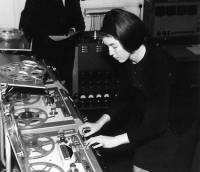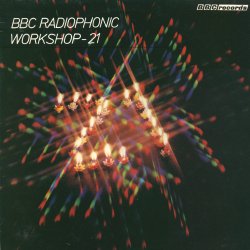
The BBC Radiophonic Workshop was one of the sound effects units of the BBC, created in 1958 to produce incidental sounds and new music for radio and, later, television. The unit is known for its experimental and pioneering work in electronic music and music technology, as well as its popular scores for programs such as Doctor Who and Quatermass and the Pit during the 1950s and 1960s.

Daphne Oram was a British composer and electronic musician. She was one of the first British composers to produce electronic sound, and was a pioneer of musique concrète in the UK. As a co-founder of the BBC Radiophonic Workshop, she became a central figure in the evolution of electronic music. Her uncredited scoring work on the 1961 film The Innocents helped to pioneer the electronic soundtrack.

Delia Ann Derbyshire was an English musician and composer of electronic music. She carried out pioneering work with the BBC Radiophonic Workshop during the 1960s, including her electronic arrangement of the theme music to the British science-fiction television series Doctor Who. She has been referred to as "the unsung heroine of British electronic music", having influenced musicians including Aphex Twin, the Chemical Brothers and Paul Hartnoll of Orbital.

Quadraphonic sound – equivalent to what is now called 4.0 surround sound – uses four audio channels in which speakers are positioned at the four corners of a listening space. The system allows for the reproduction of sound signals that are independent of one another.
Electronic Music Studios (EMS) is a synthesizer company formed in London in 1969 by Peter Zinovieff, Tristram Cary and David Cockerell. It is now based in Ladock, Cornwall.

The EMS Synthi 100 was a large analogue/digital hybrid synthesizer made by Electronic Music Studios (London) Ltd, originally as a custom order from Radio Belgrade for what was to be the Radio Belgrade Electronic Studio, largely thanks to contact between composer Paul Pignon, then living in Belgrade, and Peter Zinovieff. The ground-breaking analogue and digital engineering was designed by David Cockerell and documented in detail in 1971. The cost at that time was £6,500. The last unit built by EMS was number 30. Afterwards, one final unit was built by Datanomics, who bought assets from EMS when the company folded in 1979. The redesigned unit was sold to Gabinete de Música Electroacústica, Cuenca, Spain.
Paddy Kingsland is a composer of electronic music best known for his incidental music for science fiction series on BBC radio and television whilst working at the BBC Radiophonic Workshop. Educated at Eggars Grammar School, Alton, in Hampshire, he joined the BBC as a tape editor before moving on to become a studio manager for BBC Radio 1. In 1970 he joined the Radiophonic Workshop where he remained until 1981. His initial work was mostly signature tunes for BBC radio and TV programmes before going on to record incidental music for programmes including The Changes, two versions of The Hitchhiker's Guide to the Galaxy, as well as several serials of Doctor Who. His work on the latter series included incidental music for several serials in the early 1980s.
Malcolm Clarke was a British composer and experimental electronic musician. He was a member of the BBC Radiophonic Workshop, which was based in Maida Vale, London, for 25 years from 1969 to 1994.
Brian Hodgson is a British television composer and sound technician. Born in Liverpool in 1938, Hodgson joined the BBC Radiophonic Workshop in 1962 where he became the original sound effects creator for the science fiction programme Doctor Who. He devised the sound of the TARDIS and the voices of the Daleks, which he created by distorting the actors' voices and feeding them through a ring modulator. He continued to produce effects for the programme until 1972 when he left the Workshop, leaving Dick Mills to produce effects for the remainder of the show's run.
Mark Ayres is an electronic musician, composer and audio engineer.
Roger James Limb is a British composer, specialising in electronic music. He is best known for his work on the television series Doctor Who whilst at the BBC Radiophonic Workshop. He joined the BBC as a studio manager, before going on to become a television announcer. In 1972 he left this position to join the Radiophonic Workshop, where he remained until 1995. Although he had received formal music training, he also spent much time in pop and jazz bands, the influence of which can be heard in much of his music.

Dick Mills is a British sound engineer, specialising in electronic sound effects which he produced at the BBC Radiophonic Workshop.
Elizabeth Parker is a British film and television composer who worked at the BBC Radiophonic Workshop from 1978 until the workshop's closure.

BBC Radiophonic Music is the first compilation of music released by the BBC Radiophonic Workshop. It featured music by three of the Workshop's most prominent composers, John Baker, David Cain, and Delia Derbyshire. The album was originally released by BBC Radio Enterprises in 1968 to coincide with the Workshop's 10th anniversary and later re-released in 1971 on the BBC Records label.

The Radiophonic Workshop is a 1975 compilation album by the BBC Radiophonic Workshop, similar in concept to the earlier BBC Radiophonic Music of 1968. The album featured a variety of work demonstrating many of the various techniques the Workshop used. Unlike its predecessor though, it was far more synthesiser orientated. The music comes from all types of sources from serious drama and documentary to the "Major Bloodnok's Stomach" sound effect from The Goon Show. As with the 1968 compilation, the album was remastered in 2002 by Mark Ayres and re-released with two bonus tracks from John Baker.

BBC Radiophonic Workshop – 21 is a compilation by the BBC Radiophonic Workshop to celebrate their 21st anniversary in 1979. It was compiled as an overview of their work both old and new, showcasing the changes in the Workshop as they developed from backroom sound effects suppliers for BBC Radio to full-fledged in-house music composers for the whole of the corporation. It demonstrates the move from the musique concrète and tape-manipulation techniques used in the early days, to the synthesiser works of the 1970s. The first side of the album consisted of material from 1958 to 1971, covering their early work creating jingles, sound-effects and some incidental music. This side includes the first material by Workshop founder Desmond Briscoe to be commercially released, as well as sound effects from The Goon Show, Maddalena Fagandini's interval signal that later became "Time Beat", some of Delia Derbyshire's experimental work and the pilot episode version of the Doctor Who theme music. The second side of the record covered the period between 1971–1979, including Richard Yeoman-Clark material from popular BBC series Blake's 7 and Peter Howell's vocoder heavy "Greenwich Chorus" theme for The Body in Question. It was reissued on CD by Silva Screen Records on 22 April 2016.

Music from the BBC Radiophonic Workshop is a 2003 limited edition 4X10" vinyl compilation collecting and re-ordering the compilations BBC Radiophonic Music and The Radiophonic Workshop, including the bonus tracks from their 2002 CD re-releases. It featured the remasters provided by Mark Ayres for the original re-releases. The tracks were ordered in such a way as to provide Delia Derbyshire and John Baker with the first records dedicated solely to their work. The album was released on electronic musician Richard D. James' Rephlex Records label.
Harry Desmond Briscoe was an English composer, sound engineer and studio manager. He was the co-founder and original manager of the pioneering BBC Radiophonic Workshop.
John William Baker was a British musician and composer who worked in jazz and electronic music.

Maida Vale Studios is a complex of seven BBC sound studios, of which five are in regular use, in Delaware Road, Maida Vale, west London.










